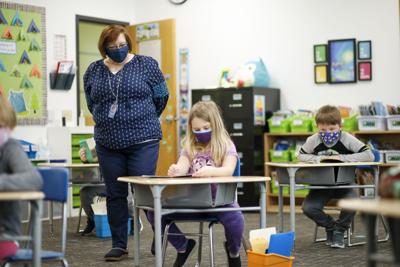Sign up for the Morning Update email newsletter
Republicans in the state Assembly are asking Gov. Tony Evers to reward school districts around Wisconsin that have been offering in-person instruction to students in the 2020-21 school year.
Many of the state’s districts have been at least partially in-person for much of the year, but some of its largest — including the Madison Metropolitan School District — have stuck to virtual learning for most students amid the ongoing COVID-19 pandemic.
Republican legislators sent a letter to Evers and held a press conference Monday afternoon asking him to distribute the $20.8 million in Governor’s Emergency Education Relief funds from federal relief bills based on which districts have been in-person.
“Districts that are providing in-person instruction have additional cleaning costs, transportation costs, staffing costs and other costs that the districts not in-person do not have,” Rep. Mark Born said during the Capitol press conference.
Evers’ office did not immediately respond to a request for comment.
The $20.8 million is a small piece of the entire education relief pie funded through the Coronavirus Response and Relief Supplemental Appropriations Act, the federal government’s second coronavirus relief package. K-12 schools in Wisconsin will receive nearly $800 million in total, including funds distributed to private schools.
Those funds are split among a few distribution requirements. Evers has some discretion over $98.3 million, about $77.5 million of which is expected to go to private schools, with allocation of the other $20.8 million to-be-determined.
But in general, lawmakers and Evers have little discretion over how the federal dollars are distributed. About $617.5 million of the funds that the CRRSA has awarded the state for K-12 education is funneled to districts through the Title 1 formula, which is based on the percentage of low-income students in a district.
The Republican-controlled Joint Committee on Finance recently authorized the roughly $69 million it controlled to be distributed based on a formula of how much time districts spent with students learning in-person.
Now the legislators want Evers to do the same with the $20.8 million he controls.
[School reopening guidelines — how do CDC and Public Health Madison compare?]
The nonpartisan Legislative Fiscal Bureau wrote in a Feb. 16 memo to Born that the CRRSA “gives each state's governor discretion to award the grants to local educational agencies, institutions of higher education, or other education related entities” for the Governor’s Emergency Education Relief funding.
“This language would not preclude the Governor from awarding the funds on the basis of whether or not a district is offering in-person instruction if he chooses to do so,” the memo states.
Evers allocated $46.6 earlier GEER funds from the original CARES Act to districts “most impacted by COVID-19” based on four criteria: percentage of students scoring below basic on English language arts (ELA); percentage of students from economically disadvantaged families; percentage of households with no devices; and percentage of households with no internet.
The legislators’ letter to Evers’ encouraged him not to “make the same mistake twice.”
“In the first GEER round of awards, you allowed a significant portion of these funds to go to districts that have provided little, to no in-person instruction during the 2020-21 school year,” they wrote.
[How a variety of Evers' budget proposals could affect MMSD schools]
The decision by the JFC did not affect funds for MMSD, as the district was not set to receive any beyond the Title 1 formula funds.
If Evers did reward in-person instruction with the GEER funds, however, it could affect MMSD, which received $3.9 million in the earlier round of GEER funding. MMSD is set to bring its first group of elementary students back for in-person instruction next Tuesday with kindergarten. First- and second-graders will return March 16 and 4-year-old kindergarten March 23.
There is not a plan in place for grades beyond those yet.




